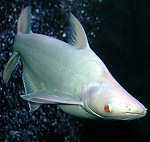 False labelling of exported goods can land exporters in a world of trouble and sometimes in places they don’t expect. We previously posted on a shrimp exporter prosecuted in the United States for misrepresentations made to Mexican authorities. Today we have a new development in the case of a Vietnamese exporter indicted in Florida for mislabeling exports from Vietnam to the United States.
False labelling of exported goods can land exporters in a world of trouble and sometimes in places they don’t expect. We previously posted on a shrimp exporter prosecuted in the United States for misrepresentations made to Mexican authorities. Today we have a new development in the case of a Vietnamese exporter indicted in Florida for mislabeling exports from Vietnam to the United States.
At issue were exports of catfish from Vietnam to the United States. Because catfish from Vietnam is subject to anti-dumping duties in the United States, the exporter in question labelled the catfish as grouper to avoid the dumping duties. In May 2006, the U.S. Attorney for the Northern District of Florida obtained a criminal indictment against both domestic importers and foreign exporters of the mislabelled catfish. An Giang Agricultural and Food Import Export Company (“AFIEX”) and Mr. Buu Huy, its Deputy Director, were included among the indicted Vietnamese exporters.
Several days after the indictment Mr. Huy traveled to Brussels to attend the European Aquatic Product Fair and was promptly arrested by Belgian officials at the request of the U.S. Attorney who had obtained the indictment. The Belgians held Mr. Huy in custody while U.S. officials sought to extradite Mr. Huy to Florida. Mr. Huy spent 133 days in custody in Belgium before Belgian officials refused, on September 20, to allow the extradition. On Monday, Mr. Huy finally returned to Hanoi. It is perhaps safe to assume that if he had plans to visit Disneyland, they have been indefinitely postponed.
The Vietnamese Association of Seafood Exporters and Processors (“VASEP”) had intervened with the Belgian government to secure Mr. Huy’s release. One of the arguments that they presented to the Belgian officials is that the Vietnamese exporters were not liable to pay the U.S. duties that were being evaded and that liability should rest solely with the U.S. importers who were obliged to pay the evaded duties. Although this explains why an exporter might believe that its actions shouldn’t lead to penalties for it in the importing country, it neglects that the conspiracy to help the importer evade duties is equally criminal. Furthermore, the fact that Mr. Huy was involved in exporting goods to the United States arguably gave the U.S. courts criminal jurisdiction.
I could find no record as to why the Belgian government finally released Mr. Huy. In addition to the argument that VASEP made to the government, Mr. Huy’s lawyer also argued that AFIEX stopped exporting to the United States prior to the imposition of the anti-dumping duties and that the shipments had the correct Latin name for the fish. The important point here, however, is that exporters should understand that unlawful exports can result in liability in both their home country and in the country to which the goods are shipped.
 Permalink
Permalink
Copyright © 2006 Clif Burns. All Rights Reserved.
(No republication, syndication or use permitted without my consent.)

 Posted by
Posted by  Category:
Category: 

